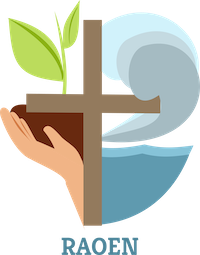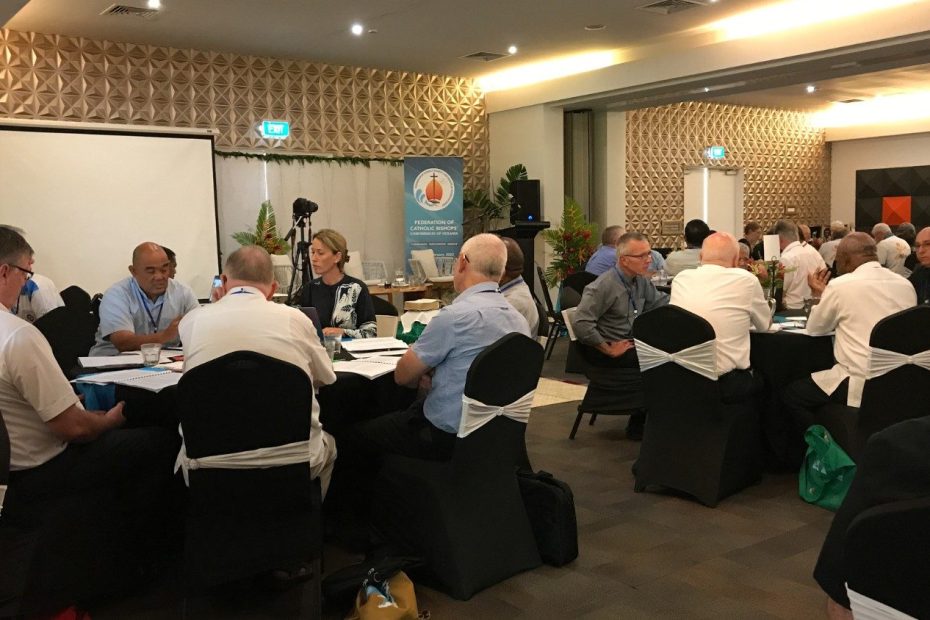During the Federation of Catholic Bishops’ Conferences of Oceania 2023 Assembly in Suva Fiji, Pedro Walpole SJ, Network Coordinator of the River Above Asia Oceania Ecclesial Network (RAOEN), shared about the network’s purpose in engaging the Indigenous and Local People in the Oceania-Asia biome, and their relation with all life and territory. Fr. Walpole also invited all those present in the Assembly to join RAOEN’s call for reconciliation through the work of the Church in connecting deeply with the stories of local communities – the relationships with culture and their land, and how faith is expressed in their daily lives.
Yadra vinàka.
On your tables are booklets that explain why and how RAOEN was formed four years ago and some of the local stories being shared. Coming from the Synod on the Amazon, the value of ecclesial networks was highlighted, especially in engaging the indigenous and their relation with all life and territory.
In the materials that were shared are the reflections of Cardinal Ribat and Cardinal Oswald on the Amazon synod in relation to their own people’s experiences.
“I see we are all affected by what is happening to mother earth. This helps me to realize that we are united in a way. We are in the same region, we are in the same experience. This calls us to respond in a way that unites us in caring. How can we begin a kind of network that will bring out what we have in our region? How can we be united in our response?” – Cardinal John Ribat, Archbishop of Port Moresby, Papua New Guinea
“I see that what’s happening [in the Amazon region] is really a worldwide phenomenon of disgracing [indigenous] people. The most intense cry, and consistent cry, has been the violence against the indigenous people, the killing of these people—their leaders, and the violence against their culture…they need to be [protected] against that at all costs.” – Cardinal Oswald Gracias, Archbishop of Bombay
Oceania and Asia are seen as one in terms of the biome and the Pacific Ocean sustaining ‘the River Above’ – the weather patterns and climate – that feeds all the rivers of these regions. It is the ocean that defines the climate that is now assaulted by rampant techno-economic development.
Reflecting on the oceans as local faith communities
Learning about the oceans is not just about the science of climate change and social vulnerability. As the local church, we also share and listen to the actual lived experience. This includes the spirituality of the local community which engages through the lived experience of their faith in Jesus in their landscape. The gospels have landscapes and seascapes, and this forms the story and life of the people as they journey in following Jesus. It is not a matter of preserving the environment that entails the relocation of people, but rather an acknowledgement of the integral living of these people with land and sea as guardians connecting each stage of life. This calls for new roles and relations that need to be recognized and valued within society.
We are working with the three phases of see (as in listen), judge (as in analyze and discern), and action. At the core of our synodal reflection and discernment are the relations in the ocean-lived experience and people’s live that needs to be listened to. This is where we also find healing and reconciliation. The analyses – the science and the policy – then become part of the action needed and is an affirmation of the core experience. The local discernment forms the action dimension of faith. We act out of faith, we act inclusively, and we act out of hope. This gives us a more integral and humble human development.
Three thoughts on ecclesial networking
a. How we need to live in relation to creation. The recent years of bushfires, floods, and droughts where many of us have experienced the impacts on families and communities, challenges all of us in now we need to rework our engagement with the land, water, and all life. Oceans greatly determine the climate that gives us these extreme events. With a new phase of El Niño projected for 2023-2024 that will further break temperature records, this is not just a simple a wake-up call, but a call to conversion and action. We need to dream of well-being and interconnectivity.
b. How to be more synodal and walk with people, as with basic ecclesial communities that can form as part of the journey is the challenge. We can foster the spiritual reflection and understand better how the People of God seek to live out their faith in their local context. This is vital to the life of the Church. A regional theological reflection needs to pick this up through listening and not to simply determine relations.
c. How we live our faith daily comes in different forms: reflecting with the Bible, with the Book of Nature, the vulnerability of peoples in the rural peripheries of the modern urban ecology and economy, and the urban misery of the poor. Most of these people make a livelihood that is dependent upon Creation and not just on the economy. They need to be accompanied in this interconnecting crisis as we work in a synodality process.
Connecting with communities in the margins on the experiences of culture, faith, and spirituality
Society often lives in a land-locked state (also in terms of our state-of-mind), inhibiting the experience of the connectivity of all life given to us. As we gather here for the Assembly, food, art, culture, the morning light, and the grains of sand are all part of the relationships that we build. We need to experience not only the dynamic ecosystems of Creation and evolution, but in putting together major numbers and expanses of these ecosystems. We then begin to understand how these gives us climate and how we relate and overburden these ecosystems, changing climate and the sustainability of life as we know it.
We draw images of God from Creation who speaks to us by connecting our emotions, movements, culture, and faith. This comes in different forms:
- Creativity of each person is constantly enriched by what we experience in creation, through hope, art, love, mourning, regeneration
- Conversion of a person’s mind, being, soul, and their neighbor
- Vulnerability in terms of food, water, shelter, neighbor, and economy, are all part of the daily faith being lived out in relation to Creation.
- Oikos is the balancing of our household – economy and ecology – where greater advocacy is called for to address ecological degradation and social vulnerability.
Thus, RAOEN’s effort is to learn from existing local community dialogues, their stories and beyond, to listen to their cultures about the local relationships with the environment, the challenges they experience, and understanding of the faith expressions present in how they live, by asking some of these questions:
1. What is the community context? What is daily life like and what are the socioecological challenges that these people face?
2. How is culture, spirituality and faith expressed in these communities?
3. Any stories of action in caring for the land, forests, oceans of Indigenous & Local People?
4. How do these processes and engagements by local communities strengthen relations and the life of the local church?
RAOEN’s call is for you to connect us with someone in your diocese or office who we can link with and share this information, and share with us connections with local communities who can share their stories of faith and action.
May the local bishops of FCBCO continue to support RAOEN and be involved in living out an integral ecology way of living through local daily faith.


